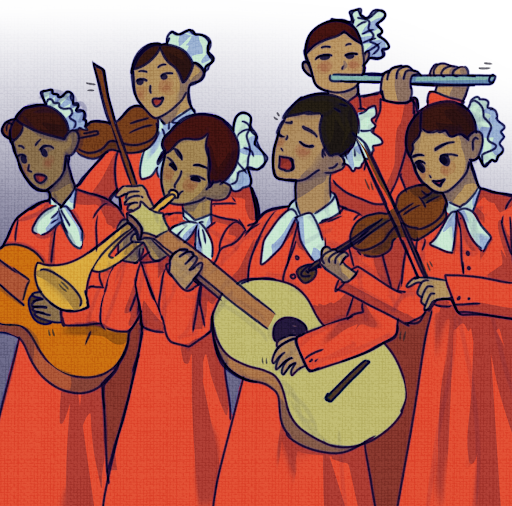The Feminine Musique: Women in Mariachi are Changing the Narrative by Challenging Gender Norms
In a genre where sexism and machismo are common themes, women in the mariachi scene are putting a spin on tradition and breaking barriers amidst traditional male-led roles.
The Feminine Musique is a series where writers analyze portrayals of women in music.
Written by Catalina Perez
Illustrated by Grace Xu
Flashy charro suits, song-embellishing yells and grand sombreros are features that add to the identity of mariachi groups. Traditionally, these groups have consisted entirely of male musicians, creating an unfortunate situation where all-male mariachi groups are considered to be the norm. However, groups like Mariachi Reyna de Los Angeles, Mariachi Femenil Flores Mexicanas, Flor de Toloache, and many other all-female mariachi groups, are breaking traditional gender norms and challenging male-dominant ideology.
Arising from the western regions of Mexico, mariachi is a genre of music deriving from regional Mexican music also known as son jalisciense, which can be traced as far back as the 18th century. Mariachi songs typically deal with themes of love, betrayal and machismo, a Spanish word which loosely translates to “strong or aggressive masculine pride.” Mariachi groups vary in size, but often consist of a violin section,a trumpet section, and a rhythm section that features acoustic guitars, vihuelas (a guitar-like instrument which is often compared to a lute) guitarron, a large guitar-like instrument which carries a bass tone, and the occasional harp.
Photo courtesy of Ana Hop
Initially, mariachi groups were made up of all male members, which may explain the sexist lyrics and themes commonly seen in the genre. One reason given for the traditionally masculine composition of mariachi groups is due to their performances taking place in environments deemed “not acceptable for women,” such as places where alcohol was present, in addition to the traveling performances would entail, as mentioned by Leonor Xochitil Perez in an interview with PBS Newshour. Rosa Quirino, the first recorded woman to play in a mariachi group, held the groundbreaking role of introducing women into the mariachi world in 1903. At the mere age of 13, Quirino played violin in an all-male group and was seemingly unintimidated by men that would poke fun at her. According to an article by the Los Angeles Times, Quirino carried a gun and would snap back at men who would taunt her. Subsequently, as women’s suffrage and equality were brought to the forefront in Mexico during the 20th century, women became increasingly involved in mariachi. In 1946, the trailblazing group Las Adelitas formed in Mexico City, becoming the first all-female mariachi band, and were followed a few years later by groups such as Las Estrellas de Mexico and Las Coronelas.
Despite progress made in the genre by pioneering women, mariachi music continued to be dominated by men when it made its way into the United States in the mid-20th century. Although the exact origins of the mariachi in the United States are blurry and ambiguous, all-male groups began to form in the United States and were popularized in the mid-20th century, such as Mariachi Los Camperos and Mariachi Cobre. The convention of male mariachi groups was only broken when Las Rancheritas, the first all-female mariachi group from the United States, was created in Texas in 1964. As time went on, women began breaking into the U.S. mariachi scene with more all-female groups, such as Mariachi Las Generales and Mariachi Estrellas, formed in the 1970s, and one of today’s most popular all-female mariachi groups, Mariachi Reyna de Los Angeles, formed in the 1990s.
Photo courtesy of Michael G. Stewart
Mariachi Reyna has broken barriers in the mariachi scene by performing for big names such as Tom Cruise, the Obamas, and Oprah Winfrey. Formed in Los Angeles in 1994 by José Hernández with the help of Mexican actress and singer, Lola Beltrán, Mariachi Reyna was formed in hopes of being the group that other girls in mariachi look up to. In an interview with Stetson, members of the group detailed, “We give girls the opportunity to learn from other women. Growing up, I was confused about why I didn’t see women in mariachi bands until I was introduced to Reyna.”
Mariachi Divas de Cindy Shea, also formed in Los Angeles, is another revolutionary all-female group which has raised the bar. The group plays traditional mariachi music, but is also known for diving into other genres such as pop. Established in 1999 by Cindy Shea, Mariachi Divas have since won two Grammy awards, become Disneyland’s leading all-female Mariachi group, performed in Disney’s Pixar’s Coco: A live-to-film concert experience, and have performed alongside Alejandro Fernandez, a well-known Mexican singer, according to their website. In Texas, all-female group Mariachi Femenil Flores Mexicanas (pictured earlier in this article wearing pink charro outfits) have paved the way for other all-female mariachi groups in the United States. Emerging from El Paso, Texas, the group, led by director Lilly Sanchez, has participated in and been recognized in major events, such as Susan G Komen’s “Passionately Pink for the Cure” campaign in 2006, accompanying and touring with Grammy Award winning artist Lila Downs, and has even been featured in Vogue Mexico in 2019. According to their website, Mariachi Flores “continues to strive in this male dominated genre and continues striving to achieve a solid and respected position for female mariachis in the music world.”
Although the history of women in mariachi is one that has bloomed and prospered throughout many decades, women in the genre continue to fight for a present and respected position. Furthermore, modern all-female groups showcase that fight by singing with pride and honor, not only for their heritage, but to highlight the presence they’ve created thus far. From Rosa Quirino to Mariachi Reyna de Los Angeles, women in mariachi have shown that they have broken barriers since the beginning and continue to do so today, pushing forth equality not only for women in mariachi, but for women everywhere.



